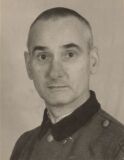back...We have learned the post-war history of the commandant of the Nazi German Concentration Camp for Polish Children in Łódź
The exact biography of the commandant of the Nazi German Concentration Camp for Polish Children on Przemysłowa Street in Łódź, SS Sturmbannführer Friedrich Camillo Ehrlich, has been discovered by the historians of the Museum of Polish Children – Victims of Totalitarianism.
Friedrich Camillo Ehrlich – the son of Friedrich Moritz and Lina (née Schaller) – was born on February 23, 1893 in Löβnitz, Saxony. He belonged to the Evangelical Church of the Augsburg Confession. In 1922 he married Elisabeth Oelsner; the couple had no children.
From November 23, 1914, Ehrlich fought at the front in the Reserve Infantry Regiment 104, then in the Infanterie Regiment 438. He ended his service in the Reserve Infantry Regiment 274. Towards the end of World War I, he attained the rank of lieutenant. He was also awarded the German Iron Cross of the Second Class.
On December 16, 1918, Ehrlich joined the criminal police. He attended lectures on law and criminology at the University of Leipzig and worked as a trainee at the Institute of Forensic Medicine. He completed a course at the police academy in Düsseldorf, passing the police commissioner exam in 1919 or 1920. In 1920 he served in Reichswehrbrigade 19.
From 1920 to 1937, Ehrlich worked as a detective inspector in Chemnitz. During the March Action (Märzkämpfe in Mitteldeutschland) – riots triggered in March 1921 by German communists – he was an officer in the secret security service (geheimer Nachrichtenoffizier).
In 1937 Ehrlich was transferred to the Nazi Kripo (Criminal Police) in Berlin, and on May 1 he joined the NSDAP (ID number 5917550). In 1939 he was appointed chief of the criminal police in Chemnitz. On April 20, 1939, he joined the SS (ID number 324979) – initially with the rank of Obersturmführer, from September 10 with the rank of Haupsturmführer, and from November 1, 1940 with the rank of Sturmbannführer.
On October 1, 1941, Ehrlich was promoted to Government and Police Councillor (Regierungs- und Kriminalrat) and transferred to Litzmannstadt (Łódź). On January 17, 1942, he became the head of the criminal police. He lived at Ulrich-von-Hutten-Straße 22 (today: Kpt. Franciszka Żwirki Street). When the camp at Przemysłowa Street was established, Ehrlich was appointed the commandant (Lagerkommandant), a post he held until January 18, 1945. He left Łódź before the Red Army entered the city. He moved to Berlin, then to Karlsbad and finally back to Chemnitz.
On May 29, 1945, Ehrlich was arrested in Chemnitz by a unit of the NKVD. He was sent to the NKVD Speziallager No. 9 in Fünfeichen, established by the Soviets on the site of the former German Stalag II-A Neubrandenburg. Ehrlich remained there until September 1948. Then he was transported to the Buchenwald Speziallager No. 2; his camp number was 53972.
On February 10, 1950, he was transferred by the Volkspolizei to Waldheim prison. Between April 21 and June 29, 1950, 3,400 people accused of collaboration with the Nazi regime appeared before the special criminal chambers of the Waldheim Land Court. Ehrlich was one of them. The indictment charged him with active participation in the Nazi terror system. On May 16, 1950, the court sentenced him to life imprisonment, deprivation of public rights and forfeiture of property.
Initially, Ehrlich was serving his sentence at Waldheim Prison. His prisoner number was 1884/50. From July 9, 1950 to February 19, 1952 Ehrlich was kept in Brandenburg-Görden prison, where he was given the number 2094/Br. He then returned to Waldheim Prison, receiving a new number – 7711/52. From March 29, 1954, he was imprisoned in Bautzen.
On April 28, 1956, Ehrlich was set free by the East Germany authorities; no cause was given for his release. He left for West Germany, where his conviction was declared to be unfounded. He applied for a job in the criminal division of police forces, however, the application was rejected as Ehrlich was due to reach retirement age in two years. From 1958 he lived as a pensioner in Munich, publishing texts on criminology. Among other publications, he wrote a handbook for police officers, which he prepared in order to “provide investigators with new experiences or remind them of past incidents (...) to support the police in their difficult work, and finally to provide parents and educators with material that would help them instil in German youth the belief that crime in fact does not pay.” It was with concern for the good conduct of German youngsters that he justified his attempts: “I wish to show our youth that criminals are rats, rats and nothing but rats. I want to make it clear that it is in no way worth giving in to the temptation of crime. Crime is a treacherous slope – once you enter that path, there is no way back!”
On March 2, 1973, Ehrlich was questioned in connection with the proceedings conducted by the Hamburg public prosecutor’s office against Heinrich Fuge, who had been the first deputy commandant of the camp at Przemysłowa Street. Ehrlich was one of the defendants. He was staying at a nursing home in Munich at that time.
While interrogated, Ehrlich denied committing the crimes he was accused of. He claimed that he had forbidden the beating of children and had never seen the guards using quirts or whips. Ehrlich asserted that he had allowed children to see their families and that doctors had been called whenever needed. He also denied that prisoners had been killed en masse or died of exhaustion, asking i.a. where the bodies of the dead were supposed to be buried. He drastically understated the number of victims, maintaining that only three child-prisoners had died in the camp. The former commandant argued that children could not have been overburdened with work as there had not been enough tasks for everyone. He also claimed that he had provided all inmates with new clothing and underwear. At the end of the hearing, Ehrlich stated that his conviction after the war had been unfounded and put his health at risk.
Friedrich Camillo Ehrlich did not live to participate in his retrial – he died on June 6, 1974 in Munich. Unfortunately, he was not prosecuted by the justice system of the Polish People’s Republic. Even after the political changes that took place in Poland, the Ehrlich case was neglected.









